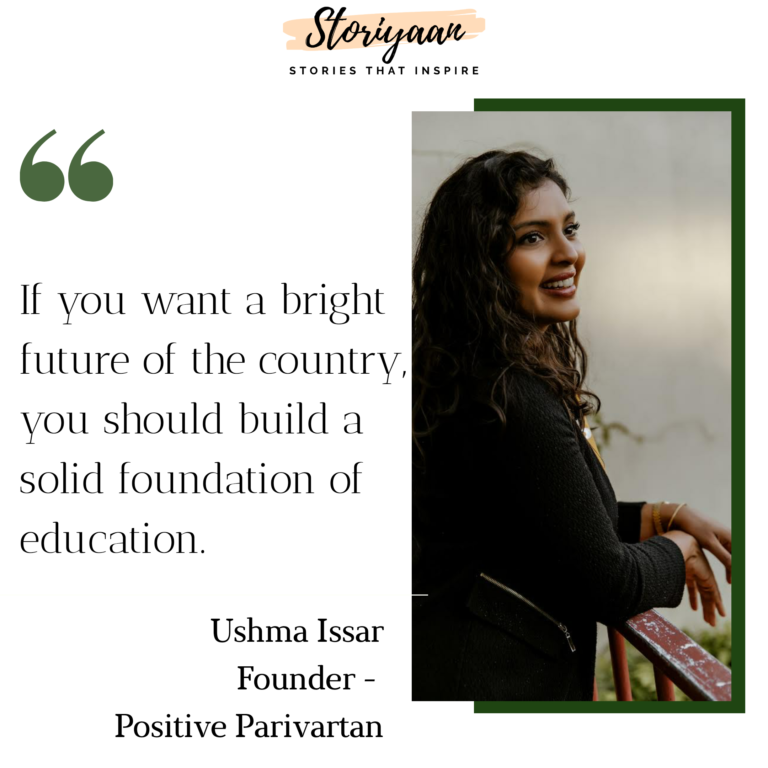Ushma Issar is a global citizen, trying to make a global difference. She founded Positive Parivartan with a mission to inspire goodhearted decision-making. With the transformation into goodness, Ushma values compassion, integrity, and inspiration.
She believes that goodhearted decisions and leadership can help address broader social and economic issues like poverty, equality, violence, and education.
Team Storiyaan spoke with the inspiration about her ideologies, motivations, and her dream of becoming the Prime Minister of India.

Interview
Questions and answers
How did you get into the healthcare industry?
One fine day my father said that as the medical devices industry was booming, I might find it interesting. I started from there. I was always confused about whether I should be a doctor or a businesswoman. I decided to combine both as biomechanical engineering in Germany.
What is your inspiration and motto behind creating 'Positive Parivartan'?
When I was young, I watched a politician on the TV talking about peace, wanting to collaborate, striving for values, and diplomacy. The more I learned, the more I understood how important it is to align your speech with your actions. Gandhiji said: Happiness is when; what you think, state, and do are aligned. That’s what I strive for at Positive Parivartan.
Having had a closer look into the healthcare system, what, according to you, would be an ideal healthcare model?
The way we see the healthcare system at this moment is based on a market. The patient is at the center of the healthcare system; if the patient is ill, all the stakeholders earn money. If the person is healthy, no one earns a penny. I believe in a sustainable healthcare system where healthcare stakeholders are incentivized to keep the patients healthy. It’s not a new concept. Ancient Chinese medicine applied this model. Li Shizhen, a proponent of Neo-Confucianism, believed ‘that cur[ing] disease[s] is like waiting until one is thirsty before digging a well.’ And today, it could look like a monthly subscription to doctors as long as I’m healthy- this is just an example model. The big pharmaceutical companies and doctors’ interest then are aligned with keeping the patients healthy.
There is a vast difference between the older generation and Gen Z regarding lack of physical activities or hyper Technology and codependency. How do you think the GenZ is capable of bringing about profound changes?
I think there is proof that the Gen-Z is striving for purpose. I saw a LinkedIn lecture where Deepak Chopra talked about a power-shift from a spider model to a starfish model. This shift from power is something that is led by generation Z. This is an internal strive for purpose. The whole movement on social business is something I think the Gen-Z are capable of growing. If you have two options-getting rid of the bad or focusing on the good, then I’ll choose the latter. Strategically, I choose to focus on growing good.
Your blog can help change a person's perspective towards issues that need to be seen differently. How do you conduct your research?
I look at the conditions, read news about it, and ponder over the solution. Currently, we live in a world with free sources of information. This can sometimes be overwhelming. We can google whatever we want. We live in a world with free access to information. Sometimes it comes from reading books and newspapers. It’s more like going with the flow. I don’t have an actual scientific process. Also, I read arguments from the opposite perspective to understand it more.
Tell us about your dream of becoming the Prime Minister of India. When did it first occur to you? What do you think you can do differently than our current Prime Minister?
Are the healthcare service providers incentivized for the benevolence of society? Is the government incentivized to change the regulations about climate change? The movie “Inconvenient Truth” talks about the following: ‘The force against climate change is bigger and backed by much more money than the force trying to minimize the consequences of global warming.’ That’s what I would like to change. As a prime minister, I would focus on aligning incentives and creating a sustainable education system, healthcare, and our planet.
You wrote, "I have a dream that there is no such thing as a social business," can you elaborate a bit about it?
Social business is a combination of the model of a NGO and a For-Profit Business. What we take from the social enterprise is the value proposition in the society. In my opinion, all companies should be social businesses. I want all businesses to provide societal value. That’s where the difference comes in. Societal values should be fully integrated into the business model.
Many students choose the US and other European countries to pursue their higher education, and some settle there. How do you think this affects the future of our country?
To grow your country, I tend to look at the basics of education. Manish Sisodia wrote a book called ‘Shiksha.’ All issues in the world, anything negative, can be solved with education. If you want a bright future of the country, you should build a solid foundation of education. Do all citizens of India have equal access to education? That’s the question that needs to be answered first before we talk about Higher Education.
During your tenure with Omron healthcare firm, you led a CSR project in Makoko, a floating slum in Nigeria. Did the scenes of poor health care status of people over there affect you?
Yes, very much. You will have a heart of stone if it doesn’t affect you. It’s one of the biggest slums in water in the world. Before donating money to these impoverished areas, I ask myself, “Will it bring sustainable development?” That’s where the topic of education comes in. There was a very discussed case about a school. It was built on a boat by a Dutch company, NLÉ. Building a floating school became exciting news for the Makoko region. But what happened was there was no maintenance, there was no follow up, and the entire school collapsed. There is no company which can go there and stays there.
How is the integration of biomedical and engineering fields impacting advancement and helping out people?
The technology wasn’t as advanced as it is now. What’s important is that the technologies developed specifically for the healthcare system are tremendously beneficial. We have a health-tech start-up industry that is booming. It provides more opportunities to keep people healthy and make it easier for people to manage their health. It’s essential to work on the incentives’ alignment and learn how the system’s money flows. In my opinion, the public sector needs to take responsibility.
You have pursued biomedical engineering. Did you consider getting into research and development?
I personally never did, but that doesn’t mean one shouldn’t. The question is, ‘what do you want?’ If your curiosity is leading you in a direction, please follow it. There’s no right or wrong way to it. I personally never considered research and development because I was never made for it. I’m into strategies and curating missions for healthcare, climate change. I’m more into the bigger picture like Positive Parivartan.
Since you inspire making good-hearted decisions for future leaders in the private and public sector, as mentioned in your website, what's your approach to it?
I founded Positive Parivartan in January 2020. It is still at a nascent stage. We are still figuring out how to make a living of it. It’s essential to increase reach to a large audience. We make sure to follow content which is similar to what we stand for, and are aligned with our vision and mission. I also focus on writing blogs and articles covering various topics worldwide, on things outside, and a lot more on looking at a big picture. We are still trying to open up for the Global audience; let’s say we are at the base.
You had set up this business in January of this year. What are the hardships that you're proud of overcoming?
It was as simple as thinking about what changes I have to make. Which sector of government will that make it happen? Which position will help me initiate those changes? It’s the Prime minister’s part. So I need to be the prime minister. It was as easy as that. The hard part was to put it online. I made the website and wrote an article. The launch day was on my 31st birthday on 17th January. Everyone does not love my appeal. Being on Youtube for media helped in spreading inspiration for goodhearted decision-making and reaching a wider audience.
Quick 5
1. Posting on Instagram or writing a blog : Writing a blog.
2. Climate change activist or mental Health care coach : Mental health care coach
3. Favorite destination : India
4. Your biggest inspiration : Depends on being in the moment.
5. A quote you live by : “Sell your cleverness and buy bewilderment. Cleverness is mere opinion; bewilderment is intuition.” ~ Rumi

